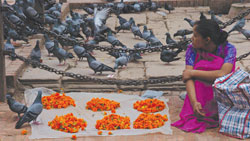 Two months after parliament was restored and the palace sidelined, the seven party alliance is working to transform the economy just like it transformed politics.
Two months after parliament was restored and the palace sidelined, the seven party alliance is working to transform the economy just like it transformed politics.
But as Finance Minister Ram Sharan Mahat prepares to deliver the budget to parliament on 11 July he is faced with formidable challenges: a huge revenue shortfall, a government distracted by keeping the peace process on track, Maoist warnings that they want to have a say in budget priorities and hesitant donors.
Mahat knows the people's expectations are high and wants a big budget that can dramatically improve services and create jobs.
"We need the money to show we can do it," Mahat told a pre-budget conference on Tuesday. Nepal's donors all say money is not a problem, they want a list of priority areas from the government and a strategy to improve disbursement.
Mahat shows visible impatience with this talk: "We have an urgent liquidity crisis and we need them to put their money where their mouth is for budgetary support."
Despite wanting to reward Nepal for restoring democracy, donors are still wary about what the Maoist role will be when they join the interim government. They also don't seem convinced that just pouring in more money will help.
"I'm not sure a big increase in the budget is necessarily what we are looking for," one senior donor representative told us, "We want to be convinced that the money can be spent properly."
The government is so caught up in trying to bring the Maoists into the mainstream that it hasn't had time to think about how to improve disbursement. Prime Minister Girija Koirala's health is also a factor. His presentation to parliament of the government's pre-budget plans and programs, a ritual that used to be carried out by the king, has been postponed till Sunday.
"It is almost immaterial to which specific programs the new budget will allocate its resources, as long as they meet some significant needs," says World Bank Nepal representative, Ken Ohashi, "It is, however, absolutely essential that what is promised is delivered." (See p 4-5)
The government was reportedly working on an ambitious Rs 200 billion budget but has been forced to scale it down to about Rs 120 billion. Revenue has fallen below Rs 80 billion and most of the rest must come from foreign aid. There has been a chronic shortfall of 20 percent between expenditure plans and actual spending and in fiscal 2005-2006 this is expected to cross 35 percent. "There is really no point adding more money unless we can spend it," one ministry official told us.
Scared off by radical Maoist rhetoric, investment is also at a standstill. It is urgently needed to address electricity generation shortfalls which NEA estimates will mean up to eight hour per day loadshedding every winter for at least the next six years.
The two big projects that can be completed fastest are Upper Karnali and Upper Tama Kosi but both are stuck because of government indecision.


